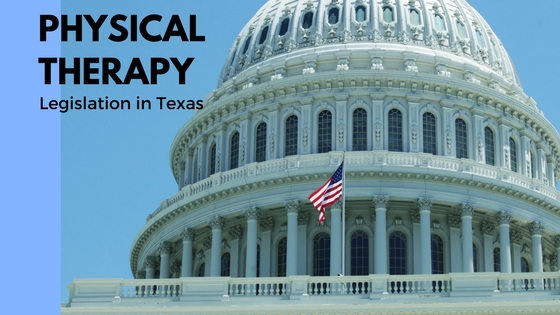Brad Bevil, PT, DPT, MPTC recently represented Symmetry as well as physical therapists across Texas at the Texas Physical Therapy Association’s Legislative Action Day last Tuesday, February 19th. He spent the day at the Texas Capital speaking to legislators about physical therapy and musculoskeletal health issues pertinent to Texas health care consumers. Specifically, the action item of the day was to encourage our Texas Representatives and Senators to support House Bill 29 and Senate Bill 732 – both of which, if passed, would allow patients to directly access physical therapy services without the requirement of obtaining a referral.

Texas is one of only two states that do not allow access to physical therapy treatment without a referral. This current policy creates an unnecessary barrier to access to health care in a state that ranks 47th in the nation for timely access to primary care health services. Delaying and otherwise creating barriers to physical therapy care can drastically increase the societal costs of having workers miss work due to injury or having elderly citizens lose their independent living status.
Studies consistently show a correlation between early physical therapy treatment and significant reduction in the use of opiod pain medications for musculoskeletal pain. Currently in the United States, musculoskeletal pain issues affect nearly half of the adult population. Pharmacologic pain management prescriptions are costing the health care system $854 billion dollars annually. And alarmingly, > 115 deaths occur EACH DAY due to opiod overdose! Instead of prescribing expensive and dangerous opiod medications, wouldn’t it be better to enable patients to seek the assistance of a physical therapist to safely manage pain and eliminate its mechanical causes?
Early access to physical therapy care also significantly lower’s patients’ out of pocket costs for medical care, as well as insurance costs, for a variety of musculoskeletal health issues. A study by Health Services Research of patients with low back pain found that patients who were able to see a physical therapist at the 1st point of care had a 15% lower chance of requiring an emergency room visit to manage pain, as well as a 28% decreased probability of needing costly medical imaging. Additionally, these patients had a remarkable 89% lower probability of utilizing an opiod pain medication prescription. All of these benefits result in significantly lower costs of total medical care, as well as a better functional outcome for the patient.
Physical therapists’ expertise in optimizing movement and musculoskeletal function for patients of all ages has a significant impact on keeping Texans healthy and involved in their work and daily activities. A physical therapist’s ability to keep patients healthier also decreases the systemic costs of some of the most prevalent disease processes in this country, such as cardiac disease and diabetes.
Symmetry will be continuing to actively support House Bill 29 and Senate Bill 732 as they (hopefully) make their way forward through the legislative process. You as individual Texas voters, constituents, and health care consumers can also help to move the process forward. If being able to access physical therapy care is an issue that you agree is important, please urge your Texas Representative and Senator to support this legislation. Writing letters and/or making phone calls to their offices to share your personal stories and opinions can make a difference. Specifically ask your legislators to sign on to HB 29 and SB 732 as co-sponsors. This action would demonstrate the widespread support of the Texas citizenry for improved access to musculoskeletal health care and would give the legislation momentum as it heads towards discussion in committee and ultimately on the House and Senate floors.
If you need contact information for your individual legislators, visit this site. For further statistics and information about these bills or the state of health care in Texas, feel free to contact us at Symmetry.
Please also watch our blog, newsletter, and other social media posts for future updates.

